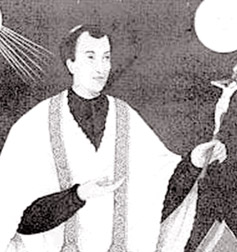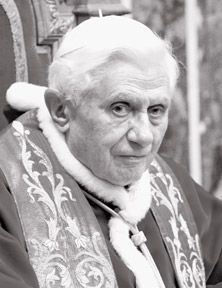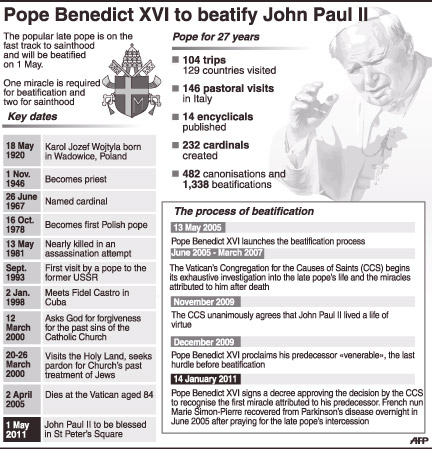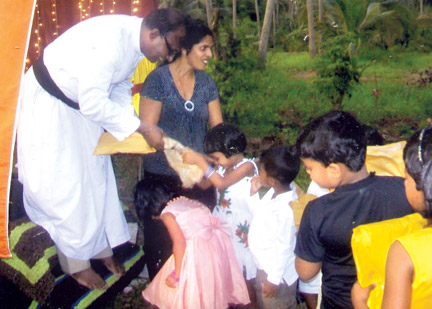|
Christian Perspective
Blessed Joseph Vaz - the Apostle of Sri Lanka
W T A Leslie Fernando
The 300th anniversary of the death of Blessed Joseph Vas known as the
Apostle of Sri Lanka was celebrated yesterday. Blessed Joseph Vaz came
to Sri Lanka in 1687 under the guise of a coolie. He ministered to
forlorn Catholics in Sri Lanka for 24 long years amidst the Dutch
persecution. He passed away in Kandy, January 16, 1711 and his remains
were interred in Kandy.
|

Blessed Joseph Vas |
It was Blessed Joseph Vaz, who saved the Catholic Church in Sri Lanka
from extinction during the Dutch period. He also laid the foundation for
an indigenous Church in our country. He was beatified in Colombo on
January 21, 1995.
In 1658 the Dutch ousted the Portuguese from the maritime provinces
in Sri Lanka. For both political and sectarian reasons the Dutch set
their face against the Catholics, proscriend the religion drove away the
Catholic priests and took over Catholic churches and schools.
For 30 years there was not a single Catholic priest to minister to
Catholics and Catholic activity almost disappeared in the island. It was
in this plight of the Catholics that Blessed Joseph Vaz came to Sri
Lanka and revived the Catholic faith.
Blessed Joseph Vaz was a Konkani Brahamin by lineage and was born at
Benelim in Goa on April 21, 1651. He was ordained a priest on 1676 and
was the superior of the Oratory of Goa when he came to our country.
Before leaving Goa he made arrangements for other Oratorian priests to
follow him for missionary work in Sri Lanka.
Blessed Joseph Vaz proved himself to be an embodiment of Christ. He
waked barefooted all over the country visiting the scattered Catholics
and attended to their spiritual needs. He slept on a mat and fasted
daily unless he was ill. When an epidemic of small pox spread in Kandy,
He and his companion Fr Joseph Carvalo nursed both Christians and
Non-Christians.
Blessed Joseph Vaz and other Oratorians who followed him had to work
hard in Sri Lanka under the Dutch persecution of Catholics. They were
never disheartened and looked after the spiritual welfare of Catholics
under severe oppression, victimization and humiliation. They went from
place to place leading simple serene and austere lives.
It has the history of the Church that the religion strived at his
best when the faith was persecuted. It was so during the Dutch times in
Sri Lanka. During this period the Catholic faith strengthened and its
roots struck deep down in the soil in our country. Besides Blessed
Joseph Vaz unlike the European missionaries during the Portuguese times
did not implant Western culture along with the Christian faith. The
Catholic faith in Sri Lanka under Blessed Joseph Vaz and his fellow
Oratorians witnessed an excellent form of cultural adaptation.
The Oratorian priests being Easterners were in a better position than
the European missionaries in Portuguese era to understand and appreciate
the indigenous culture.
Rather than transplanting foreign forms they made an attempt to
present the religion to suit the cultural traits in our country. Blessed
Joseph Vaz himself composed Catechisms, a summary of Catholic doctrine,
meditations on the Way of the Cross and devotions and litanies to the
Blessed Virgin Mary in Tamil.
It was Blessed Joseph Vaz who initiated the performance of Passion
shows in Sri Lanka with the images of sacred personages modelled on the
Catholic puppet drama he had witnessed in Goa. It is on record in the
‘Oratorian Mission’ that there had been Passion shows in Kandy and in
Vanni in the season of Lent in 1706 and later in Trincomalee and several
other places. These Passion shows with images of sacred personages are
still enacted in churches on the Good Friday.
Blessed Joseph Vaz organized Catholic feasts and processions with a
national outlook. There were dances with sticks (Lee Kelinatum) and
traditional music at the feast of St. Anthony celebrated in Kandy under
the patronage of Blessed Joseph Vaz in the reign of King
Wimaladharmasuriya II. It was Blessed Joseph Vaz who introduced the
carrying of tender coconut palms in place of Olive branches on the Palm
Sunday.
The Church structure and usages, ecclesiastical set up, Catechesical
instructions, prayers and hymns and Catholic culture in Sri Lanka all
could be traced to the traditions set up by Blessed Joseph Vaz.
Thus Blessed Joseph Vaz not only rescued the Catholic Church from
almost extinction but also endeavoured to set up an indigenous Church in
our country.
In the light of the present context, the ascetic life of Blessed
Joseph Vaz – his spirituality, holiness and achievements should be an
inspiration to all the Catholics, both the religious and laity in Sri
Lanka.
(The writer is a
former President of Newman Society Alumni Association).
The Kingdom, the Glory and the Power
New book on Seminary life:
This book is unique in the annals of Catholic literature in Sri
Lanka. It not only narrates the author’s intense spiritual odyssey
towards the Catholic priesthood which eludes him when on the verge of
crossing its threshold, but is also punctuated with penetrative insights
regarding the Catholic Church.
This treatise is furthermore a rich compendium of the momentous
events that shook the country, Italy and the world in the nineteen
fifties and sixties.
Preface
Professor W S Karunatillake, University of Sri Lanka writing a
preface about the book says, the Kingdom, the glory and the power by
Mario Perera narrates the life, the times and the thoughts of a Roman
Catholic Seminarian. It is probably the most complete account of
Catholic seminary life ever written and spans over eleven years.
The author has spent four of those years in Rome while Vatican
Council 11 was in full session.
While studying at the prestigious Gregorian University, he has
personally witnessed the great events of that period and experienced the
wide ranging changes that took place within the Church at that time. The
narrative begins with a description of a well-known family entirely
imbued with the spirit of the Catholic Church and willing to sacrifice
all, including its three sons and wealth for the Church’s cause.
Narrative
As the narrative unfolds the author is shown advancing to the
priesthood, meeting challenges on the way and surmounting them, firmly
determined to reach his objective come what may. This spiritual odyssey
however comes to a bitter end when the aspirant is on the very threshold
of his spiritual goal, destroying his own and his family’s hopes.
This book contains the reminiscences and reflections of one acclaimed
by his superiors and confreres as an outstanding student of Catholic
philosophy and theology.
Treatise
I congratulate the author for having accomplished such an arduous
task and whole heartedly recommend this book to all interested readers
irrespective of any religious affiliation.
The Kingdoms, the glory and the power is a new book written by Mario
Perera.
Haiti must rebuild civil ‘coexistence’: Pope
Pope Benedict XVI said the time had come to rebuild civil
“coexistence” in Haiti, in an address released by the Vatican to mark
the first anniversary of the country’s devastating earthquake.
|

Pope Benedict XVI |
“The time has come to rebuild, not only material structures but, and
above all, civil, social and religious coexistence,” the Pope said in a
message read out by Cardinal Robert Sarah during a commemorative mass in
Haiti.
The Pope said he wanted to bring words of hope in the particularly
difficult circumstances of Haitians, who were mourning the more than
220,000 people killed almost instantly in the 7.0 magnitude earthquake
on January 12, 2010.
“I hope that the Haitian people will become the main actors in their
own present and future,” Benedict said, while also praising “the support
of international aid which has already demonstrated great generosity.”
The Pope marked the anniversary by naming Guire Poulard as the new
Archbishop of Port-au-Prince.
His predecessor, Joseph Serge Miot, was killed in the earthquake.
The mass was held outside the capital’s collapsed cathedral, whose
ruins have become a symbol of the tragedy — and the failure, after 12
months, to get the country back on its feet.
AFP
John Paul II to be beatified May 1
The late Pope John Paul II is on the fast track to sainthood and will
be beatified May 1, the Vatican said Friday, to the joy of supporters
and alarm of clerical abuse victims.

Pope Benedict XVI’s decision to beatify the Polish-born Pope in the
preliminary step to canonisation was immediately celebrated in his home
country.
The archbishop of Krakow, Stanislaw Dziwisz, a longtime influential
aide and friend to the late pope, spoke of his “great joy” on behalf of
“the whole of Poland.”
The country’s Solidarity legend Lech Walesa, a fervent Catholic, said
he was delighted. “A man who was a living saint will officially become a
saint. Our Pope did great things,” Walesa told AFP.
But news of John Paul II’s beatification alarmed clerical abuse
victims who called on the Church to “move cautiously” in honouring the
ex-pontiff, saying he did not do enough to combat abuse by priests
during his pontificate.
Barbara Dorris of the Survivors Network of those Abused by Priests
(SNAP)
condemned the “hasty drive to confer sainthood on the pontiff under
whose reign most of the widely-documented clergy sex crimes and cover
ups took place.”
The Pontiff himself will conduct the ceremony in St. Peter’s
Basilica, according to Vatican spokesman Federico Lombardi.
The process of beatification is usually lengthy, but calls for John
Paul II to be canonised came immediately after his death on April 2,
2005 and Benedict waived the usual rules which require a five-year
cooling-off period.
Karol Wojtyla, the first non-Italian pope in four-and-a-half
centuries, will beat Albanian nun Mother Teresa’s record, being
speed-tracked to beatification just six years and a month after his
death.
May 1 falls this year on the first Sunday after Easter, which is the
Feast of the Divine Mercy, a devotion promoted by John Paul II.
As is traditional, his remains will be moved up from the crypt to the
nave of the basilica after he is beatified.
Works are under way in St. Peter’s to make space for the pope’s tomb
in the Chapel of St. Sebastian, between the Chapel of Michelangelo’s
Pieta and the Chapel of the Holy Sacrament.
The ex-pontiff’s body “will not be displayed, it will be placed in a
tomb closed by a simple marble tombstone with the words: Beatus Ioannes
Paulus II,” (Blessed John Paul II), Lombardi said. The beatification
follows the Congregation of the Causes for Saints’ decision this week to
recognise the first miracle attributed to the Polish pope’s first
miracle.
The commission confirmed that French nun Marie Simon-Pierre was
miraculously cured of Parkinson’s disease through the intercession of
John Paul II, who also suffered from Parkinson’s.
AFP
Free will and Suffering
Human being has faculties both mental and physical.
The organs, the senses, the intellect that makes all that is social.
Imagine the man with no free will to make choices in life.
It will be a vegetable or robot with no responsibility and spice.
The thrill of life is being able to make choices.
Unknown to many the will it is that makes all choices.
Use free will and then reap what you sow with clarity
Then will you know that what happened is not fatality.
It is the free willed choice that earns your due reward.
For if it wasn’t willed with sacrifice, what use of that award
Use your will righteously at all times
For your reward awaits you when the last bell chimes
To the individual using free will in accordance with that of the
Maker
Suffering is minimal and with good conscience life is made easier.
Where-they ask is the Maker’s justice when the world is full of
suffering.
The free will collectively misplaced brings universal misery unending.
Why blame the Maker if free will is not righteous on every choice?
Suffering will follow each decision adding to the woes of the vice.
Take the child in the womb willed to distort and end life,
But struggles to survive-be born deformed-continue to pass on in style.
The mothers had free will to choose and avoid the debacle
And even before that-to avoid pleasure beyond rhythmic cycle.
Suffering will continue with free will not righteously used.
Don’t blame the Maker-with no free will the final reward cannot be
abused.
Collective free will shouted crucify-crucify to Christ
This collective psyche with un-righteous will paid a future price
For Christ said-weep not for me but for generations to come,
Implying wrong use of will has collective repercussions as humanity is
one.
Oscar E V Fernando
 |
| Rev Fr Pius Kennedy Parish Priest,
Madampe accepts offerings from children at an all religious
ceremony held at the Samagiwatta Playground, Medagama
January 1 to herald in the New Year and invoke blessings on
the country and people. Picture by Puttalam Group
correspondent |
|



